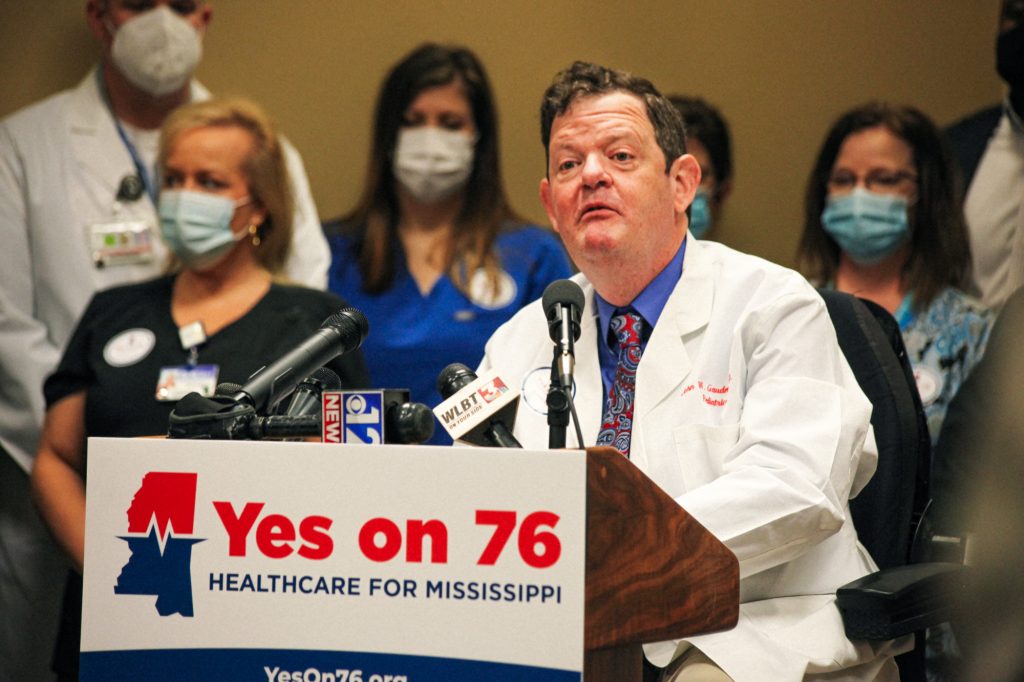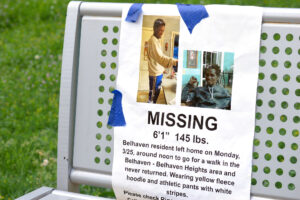Jonathan Smith wants to see his four children grow up. And, he adds, he would like to be healthy enough to be the father that his four children deserve. But to bring those hopes to fruition, the Amory, Miss., man must first emerge victorious in a two-pronged battle: one part against a cancer affecting his brain and spinal cord, the other with a health-care system that he can no longer afford.
“I have just learned I have another surgery coming up. Without insurance, I can’t afford any of this. At this point, I feel like I shouldn’t be worried about battling the treatment; I should be battling the cancer,” Smith said in Madison, Miss., yesterday.
He was sharing his story for the launch of the Yes On 76 campaign, whose organizers hope to put Medicaid expansion on the ballot in Mississippi for the November 2022 election. If voters adopted it, around 200,000 working Mississippians who cannot currently afford health insurance would become eligible for the Medicaid program.
Moore: Expansion Would Save Rural Hospitals
Since 2014, Mississippi has rejected more than $7 billion in federal dollars that could have been used to expand eligibility. Former Mississippi Gov. Phil Bryant and current Gov. Tate Reeves, both Republicans, opposed Medicaid expansion after President Barack Obama created it when he signed the Affordable Care Act in 2010.
Expanded Medicaid would help Mississippians whose household income is too high for traditional Medicaid, but who do not earn enough to afford health insurance or to qualify for subsidized ACA insurance plans.
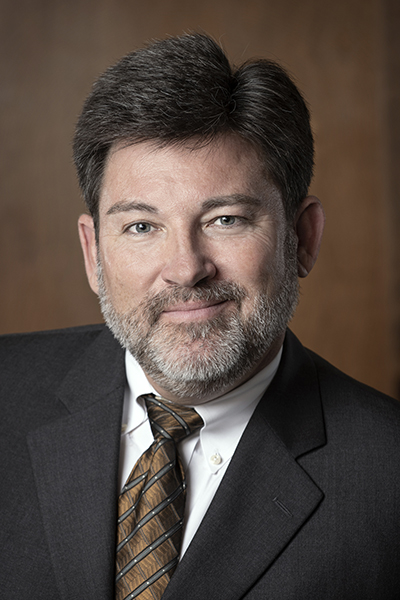
That has created a “Medicaid gap” in Mississippi and 11 other Republican-led states that have refused to accept expansion funds, leaving many households with few options for medical care. It has also put a strain on cash-strapped rural emergency rooms, six of which have had to close their doors since 2014, because they are required by law to treat uninsured patients.
“We’ve got a number of rural hospitals in our state, and 50% of those rural hospitals are in danger of closing. … We can help bridge that. We can help stop that,” Mississippi Hospital Association President Tim Moore said at the Yes on 76 kickoff event yesterday. “Stop and think just a minute: If you live in a small town in Mississippi, and you’re fortunate enough to have a hospital, it’s probably, if not the largest employer in your community, it’s always in the top three.
“Those are good-paying jobs that stay in your community and purchase goods. They support the businesses and services in that community. It is so important that we maintain that from an economic standpoint as we move forward.”
Reeves: ‘I Am Opposed to Obamacare Expansion’
During the 2019 gubernatorial campaign, Reeves said he opposed Medicaid expansion, which he labeled “Obamacare expansion,” because the state could not afford it. At the time, the federal government would have paid the full price for the first few years, with the State of Mississippi paying 10% of the cost in later years.
“I’m actually the only person running for governor that is opposed to more Obamacare in Mississippi. I don’t believe that putting 300,000 more Mississippians on government health care is a good solution,” Reeves said in 2019, when he narrowly beat pro-expansion GOP primary and general election opponents.
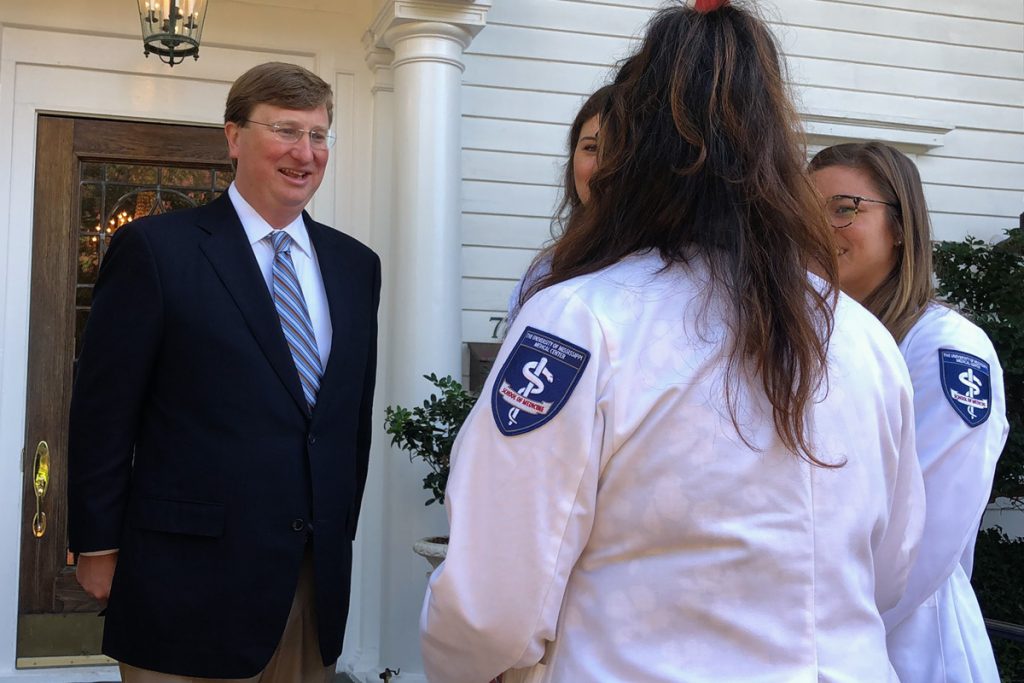
But when President Joe Biden signed the American Rescue Plan in March, the package included about $600 million in additional federal funds that Mississippi would receive over a two-year period if it agreed to expand Medicaid. Gov. Reeves again declined.
“My position has not changed. I am opposed to expanding Medicaid in Mississippi,” he said during a press conference in March. “I am opposed to Obamacare expansion.”
The Mississippi Center for Policy, a conservative-leaning think tank that is influential among Republicans in the state, also opposes Medicaid expansion. In a March 29 post, the center’s Jameson Taylor said that because of ever-escalating health-care costs, even the state’s 10% share could become too much to bear if the State of Mississippi expanded the program.
Instead of expansion, Mississippi should look for ways to “limit” the program and consider “transforming Medicaid into a catastrophic coverage type plan that only pays for major health events,” he wrote.
Several Mississippi Republicans, including Lt. Gov. Delbert Hosemann, have voiced support for some form of Medicaid expansion. But the Mississippi Legislature has repeatedly declined to move forward on expansion, despite years of lobbying from Mississippi’s medical community.
Yes on 76 Organizers: ‘It’s Time’
Yesterday, Yes on 76 organizers said the time for waiting on Mississippi’s political leaders to act is over.
“This campaign is for every single Mississippian who wants to get involved. We are committed to building the biggest, broadest, non-partisan effort the state has ever seen in order to bring health care to more than 200,000 of our families, friends and neighbors,” said Dr. John Gaudet, a Hattiesburg pediatrician, at the campaign kickoff. “For a decade, we have waited for Mississippi politicians to expand Medicaid in our state.
“Meanwhile, we’ve watched while citizens in Louisiana, Arkansas and Oklahoma have all taken action in order to bring their tax dollars home from Washington in order to pay for their citizens. And now, it’s time to do it here.”
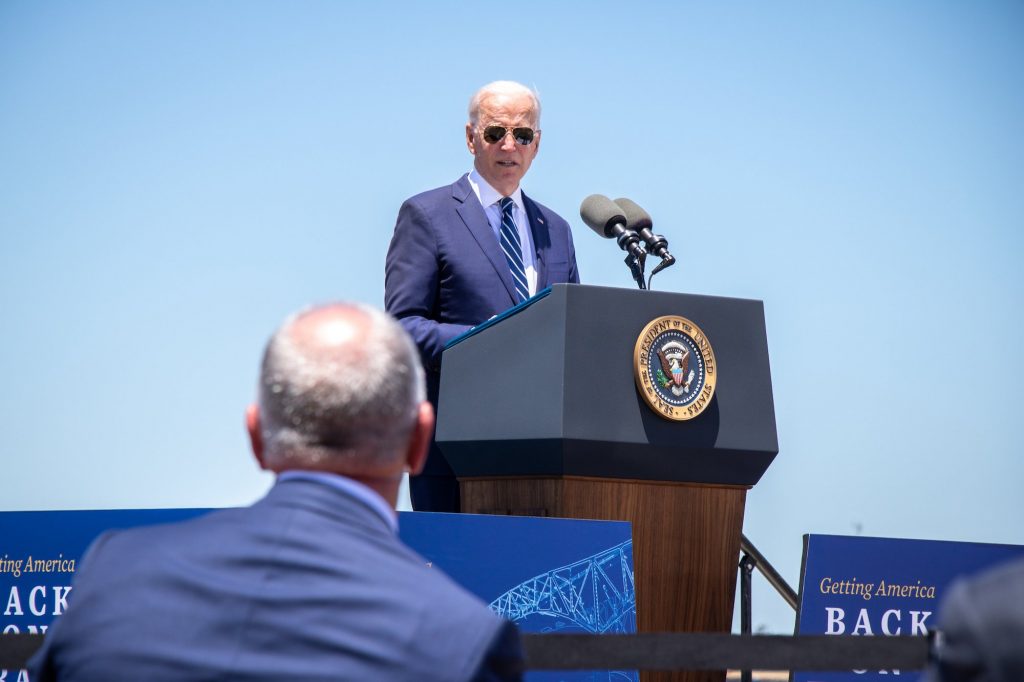
In 2015, Louisiana replaced an anti-expansion governor with Democrat John Bel Edwards, who signed Medicaid expansion into law in 2016. Louisiana State University and the Louisiana Department of Health reported that, after one year, Medicaid expansion had grown the number of people with health coverage by 470,000 while saving the state $317 million and creating 19,000 new jobs.
A November 2012 study by the Center for Mississippi Health Policy estimated that the state would have added 9,000 new jobs under Medicaid expansion and that it would have cost about $96 million by 2025.
“Multiple studies suggest that expansion can result in state savings by offsetting state costs in other areas. … Additional studies show that Medicaid expansions result in reductions in uncompensated care costs for hospitals and clinics, and a growing number of studies show an association between expansion and gains in employment as well as growth in the labor market (with a minority of studies showing neutral effects in this area),” the Kaiser Family Foundation reported in March 2020.
‘This Is Not A Political Issue. This Is A Human Issue.’
At the press conference yesterday, Dr. Gaudet said he has a niece who works as an emergency dispatch operator, but due to complications from a childhood illness, she is unable to work enough hours to qualify for employer-sponsored health insurance.
“She can’t afford her high medical bills, and she’s considering applying for disability in order to get by,” Gaudet said. “Although she regularly saves lives, we may lose her skills due to her need for coverage. … And she is not alone.
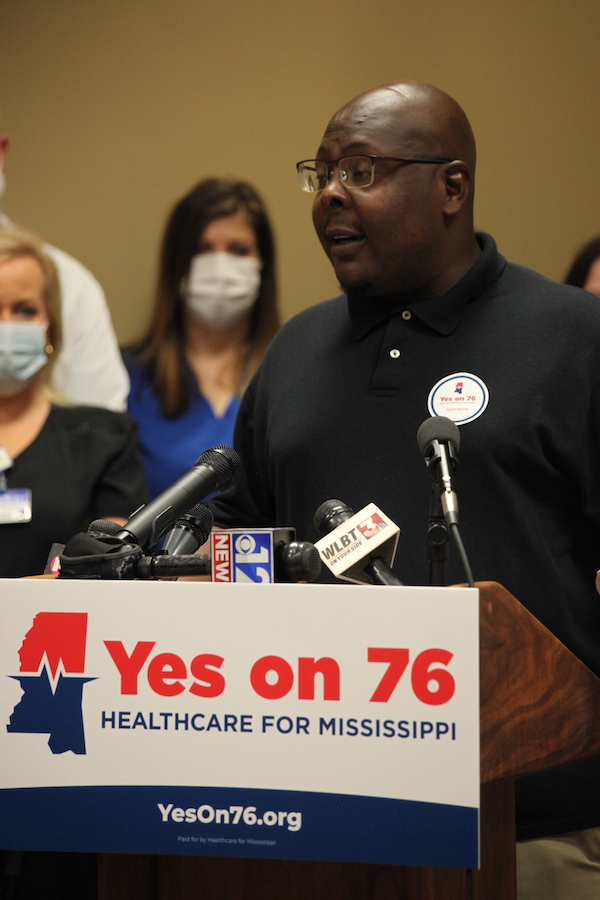
“There are thousands of Mississippians who go without insurance. Thousands of Mississippi parents go without insurance for themselves. And yes, even thousands of Mississippians who are currently battling life-threatening illnesses go without coverage.”
At the kickoff, Jonathan Smith told Yes on 76 supporters that he learned about his brain tumor while he was off on Christmas holidays from his job as a forklift operator in 2017. After having the brain tumor removed and undergoing chemo, radiation and multiple other procedures, he suffers in pain, sometimes waking up “in so much pain I cannot do much.”
“For a lot of us, this is literally a matter of life and death. Over the course of my life, I have worked, I’ve had hard times. But right now, I can’t afford insurance,” Smith said. “Medical bills have bankrupted my family. … Two years into my disease, I felt fire in my face and went back to the emergency room to find out that the tumor had flared up again.”
The Amory father of four said he is facing thousands in health-care costs that he cannot pay.
“People should be able to see a doctor and figure out what’s going on quickly. And people who are battling cancer, the last thing they should be worried about is, ‘Can we afford treatment?’ A lot of days, I feel pretty helpless. Today, I feel pretty good, though. … We have a chance to fix this,” he said. “We have got to take it.”
Dr. Gaudet concurred.
“This is not a political issue. This is a human issue. And it is a common sense solution,” he said. “…This is good for people, it is good for the economy and it’s good for the bottom line.”
Expansion Linked to Reduced Maternal Mortality Rates
Nakeitra Burse, the CEO of Six Dimensions, a Black-women-owned public-health agency that focuses on systemic inequities in health, also spoke at the kickoff event. She noted that Mississippi has some of the highest maternal mortality rates in the nation. Black women in the state are disproportionately affected. Medicaid expansion would help decrease the number of mothers who die before, during or after child birth, Burse said.
“It’s about people, and it’s very personal for me. My family has had two maternal deaths, and one was my aunt, and one was my sister-in-law. My sister also had a very severe case of pre-eclampsia and her son stayed in the NICU for three months and died,” she said. … We know that Medicaid expansion can decrease those numbers. States that have expanded Medicaid have seen their maternal mortality rates drop.” A 2020 study corroborates her claim.
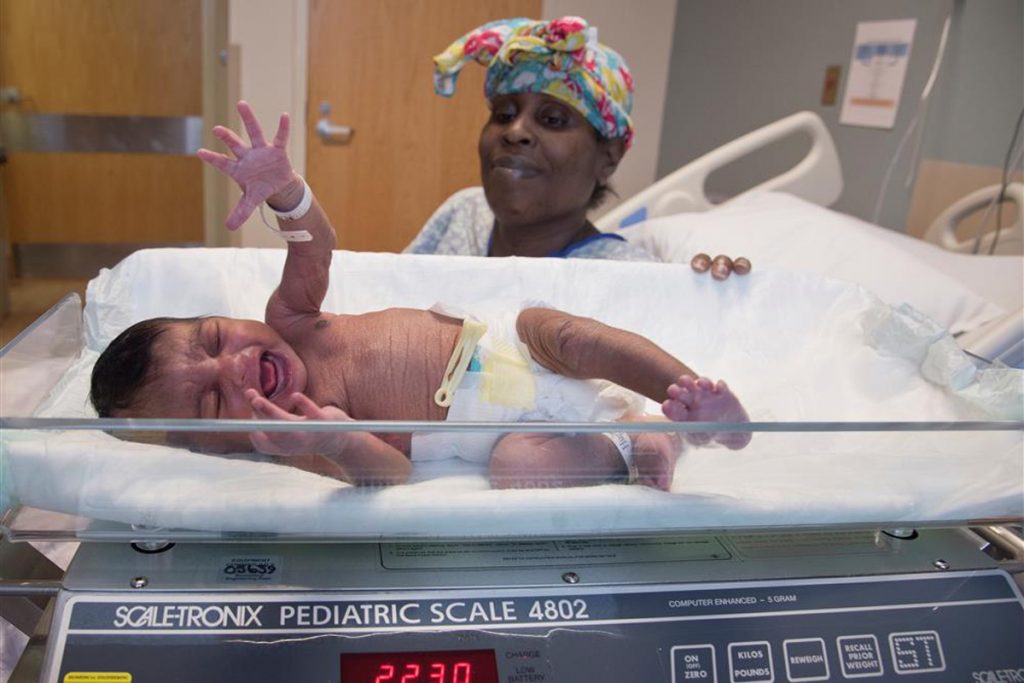
Earlier this year, Mississippi lawmakers killed a proposal that would have helped 25,000 Mississippians who use Medicaid to cover pregnancy to stay on the program for a full year after giving birth. Currently, those new parents lose Medicaid coverage after just two months.
Mississippi also has a high infant mortality rate. Throughout his political career, Gov. Reeves, like many other Mississippi politicians, including Democrats and Republicans, has fashioned himself as a “pro-life,” anti-abortion leader. He oversaw the passage of several abortion bans during his time as lieutenant governor from 2012 to 2020, all of which were either struck down as unconstitutional or are currently tied up in federal court.
“We do a lot to protect babies and to protect children in Mississippi,” Burse said yesterday. “But the best thing we can do for a child is to make sure mom and dad are healthy. And when mom and dad are healthy, babies are healthy as well.”
‘Simple, Basic Facts’
Moore, the MHA president, said that ensuring people have access to health care and preventative treatment early on will avoid situations where people face mounting debts they cannot afford—debts rural hospitals often wind up having to swallow, pushing some toward insolvency.
“If those hospitals are not there to provide access to care, that care gets put off even longer than it does now in those small areas. And what happens?” Moore said. “If you wind up putting off care, it exacerbates. It gets worse and worse. All of a sudden, you wind up in an E.R. and you get transferred to a bigger facility, and the cost of that care continues to escalate.
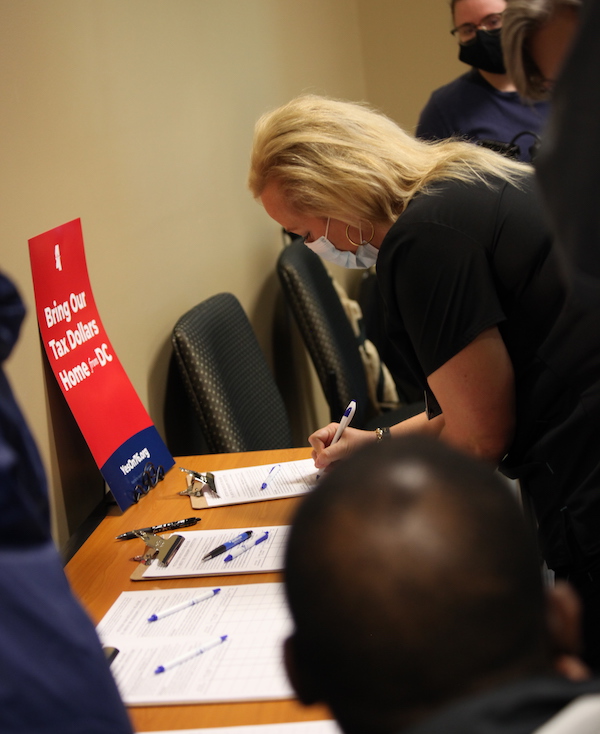
“Now, those are typically chronic issues that could have been dealt with had they been addressed on the front end had they had access to go see a family physician or practitioner that could diagnose and treat those at an early age. We’re talking about detecting diabetes at an early age and not losing a leg or foot down the road—simple things like that.”
Moore said there is no conflict between having “fiscally conservative” political views and supporting Medicaid expansion.
“If you truly want to save money in health care, you keep people healthy, and you do that by giving them access early,” he said. “…You need access to care in rural areas. We need access to care across the state. Medicaid expansion helps to preserve the financial viability of our small rural hospitals. When we do that, when we move forward with expansion, it creates jobs and economic stimulus in addition to providing health-care access across the state of Mississippi.
“Those are simple, basic facts. They cannot be disputed. If you believe in your community and you believe in small-town Mississippi, you have to believe in Medicaid expansion.”
After the press conference, supporters in the room, including health-care workers, patients, business owners and religious leaders became the first to sign the petition.
To get the issue on the November 2022 ballot, supporters will need to collect at least 106,190 signatures before October, and local and state officials must then authenticate those signatures . They will likely need to collect far more signatures than the minimum requirement, though, to overcome the likelihood that a significant number could be rejected or go uncounted.
Along with the Mississippi Hospital Association, a number of other powerful organizations are supporting the Yes on 76 ballot drive, including the Mississippi NAACP, the Southern Poverty Law Center Action Fund, the ACLU of Mississippi, the Mississippi Center for Justice and the Mississippi Chapter of the Academy of Pediatrics.
More information about the ballot initiative is available on the campaign’s website at YesOn76.org.


